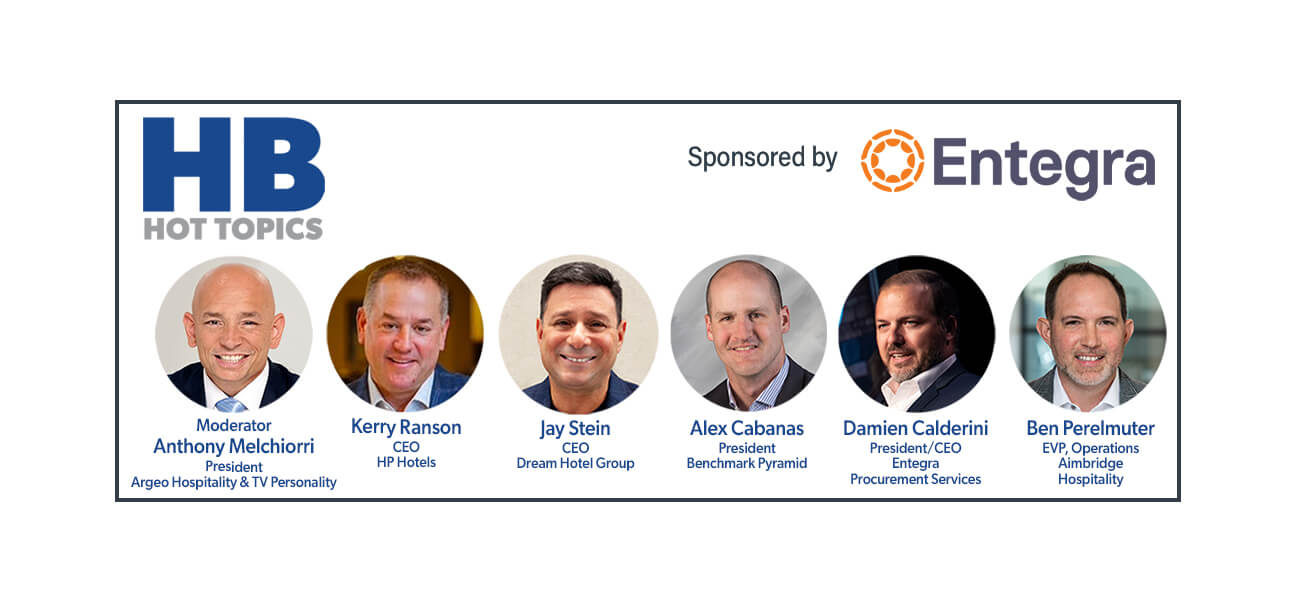During the latest Hotel Business Hot Topics session, “Optimizing performance in ’22: Improving your bottom line,” with sponsorship from Entegra, industry executives discussed two of the main issues plaguing hospitality—labor and the supply chain—among others.
Moderated by TV personality Anthony Melchiorri, president, Argeo Hospitality, the group of panelists included Alex Cabanas, president, Benchmark Pyramid; Damien Calderini, president/CEO, Entegra Procurement Services; Ben Perelmuter, EVP, operations, Aimbridge Hospitality; Kerry Ranson, CEO, HP Hotels; and Jay Stein, CEO, Dream Hotel Group.
Melchiorri opened the proceedings with a question about the impact of the Great Resignation, and added, “If I told you I had a great general manager candidate or a great front-office candidate, you’d probably drive to my house.”
Perelmuter first pointed out that “[General] managers are burnt out; they’re exhausted—and the impact ultimately is on the owner and the property,” but then noted a labor bright spot that his company has been seeing: “We’re starting to see some boomerangs—people that have left hospitality—coming back to the industry.”
Benchmark Pyramid is also seeing people who left for other jobs coming back to the hospitality industry, Cabanas said, and added, “Yes, there’s an element of exhaustion that you can’t pretend is not there; you can’t ignore it. You’ve got to be able to put your arms around people and get them focused on the horizon. We’re going to be out of this soon and some of this stuff is going to level out.”
At Dream Hotel Group’s New York properties, getting staff to return after closures of up to 16-18 months was not difficult for some of them. “A number of those are union properties, so getting those employees back was pretty easy,” said Stein. “They weren’t giving up those positions or going to the bottom of the seniority list.”
Food & beverage, he added, has been really hit hard by the labor struggle. “We opened food and beverage in our hotels in New York before we opened the hotels, and it came back really busy on the Thursday, Friday and Saturday,” said Stein. “Unfortunately, it wasn’t the seven-day busy F&B that we’re used to seeing in New York, which I’m still confident we’ll come back to once COVID is in the rearview mirror, and we’ll see that pickup back on the weekdays.”
Ranson noted that, due to inconsistent occupancies, “A lot of markets have become what we traditionally have looked at as seasonal markets. Unfortunately, our seasonal markets right now could be week-to-week, month-to-month [or] bi-weekly.”
Therefore, he said, “The challenge with those good team members that you are getting back is actually giving them full schedules that meet their needs. We’re getting them back, but the consistent demand component that’s still missing a bit still causes issues with retaining some of those good folks as they come back.”
Melchiorri later asked Calderini about the supply chain issues that have been plaguing every industry. The Entegra executive provided some worrying figures.
“The fill rate for manufacturers into distribution, typically [for] our industry, if it’s below 98%, it’s a disaster; what we’re seeing these days is close to 80%,” he said. “So, there are a lot of product shortages out there. The average time of freight to go from Asia to North America, pre-COVID, was 60 days; now, we’re looking at 110-120 days. But, it’s actually worse than that because back then, the rate of ‘in fall on time’—when you got actually got what you ordered on the day you were supposed to get it—was 85%; it is now down to 30%, sometimes even down to 10%. So, it’s actually double the time it used to take before and you rarely get everything you ordered. So, the disruption is massive out there.”
(Look for more coverage of this Hot Topics session in the March issue of Hotel Business).
